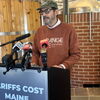Processing Your Payment
Please do not leave this page until complete. This can take a few moments.
- News
-
Editions
-
- Lists
-
Viewpoints
-
Our Events
-
Event Info
- Women's Leadership Forum 2025
- On the Road with Mainebiz in Bethel
- Health Care Forum 2025
- On The Road with Mainebiz in Greenville
- On The Road with Mainebiz in Waterville
- Small Business Forum 2025
- Outstanding Women in Business Reception 2025
- On The Road with Mainebiz in Bath
- 60 Ideas in 60 Minutes Portland 2025
- 40 Under 40 Awards Reception 2025
- On The Road with Mainebiz in Lewiston / Auburn
- 60 Ideas in 60 Minutes Bangor 2025
Award Honorees
- 2025 Business Leaders of the Year
- 2024 Women to Watch Honorees
- 2024 Business Leaders of the Year
- 2023 NextUp: 40 Under 40 Honorees
- 2023 Women to Watch Honorees
- 2023 Business Leaders of the Year
- 2022 NextUp: 40 Under 40 Honorees
- 2022 Women to Watch Honorees
- 2022 Business Leaders of the Year
-
-
Calendar
-
Biz Marketplace
- News
- Editions
- Lists
- Viewpoints
-
Our Events
Event Info
- View all Events
- Women's Leadership Forum 2025
- On the Road with Mainebiz in Bethel
- Health Care Forum 2025
- On The Road with Mainebiz in Greenville
- On The Road with Mainebiz in Waterville
- + More
Award Honorees
- 2025 Business Leaders of the Year
- 2024 Women to Watch Honorees
- 2024 Business Leaders of the Year
- 2023 NextUp: 40 Under 40 Honorees
- 2023 Women to Watch Honorees
- 2023 Business Leaders of the Year
- + More
- 2022 NextUp: 40 Under 40 Honorees
- 2022 Women to Watch Honorees
- 2022 Business Leaders of the Year
- Nomination Forms
- Calendar
- Biz Marketplace
Adding fun and games to the workplace: GoodGames helps make Zoom meetings more effective
 Photo / Jim Neuger
Daniel Stephens founder of the startup GoodGames, which helps organizations and their teams enhance communication, creativity and problem-solving remotely.
Photo / Jim Neuger
Daniel Stephens founder of the startup GoodGames, which helps organizations and their teams enhance communication, creativity and problem-solving remotely.
GoodGames is a Freeport-based startup that helps organizations and their teams enhance communication, creativity and problem-solving remotely.
Its products feature remote and hybrid team-oriented games and game-like experiences meant to give everyone a voice during meetings and keep everyone engaged during the video call. The tools also bring a game element to training, workshops, conferences and presentations.
Daniel Stephens, the founder and CEO of GoodGames, has a long history in software development and is a tech entrepreneur.
Stephens and his partner have a company called GoodFocus which is a media company, where they work with the World Bank, Red Cross and similar organizations producing media.
The Red Cross used games to help team members be more efficient and effective. The games helped foster ideas and creativity, while helping the organizations the nonprofit works with. But, during the pandemic, when the organization ran into issues trying to use these games via Zoom, Red Cross managers contacted Stephens to ask for help.
“They asked us if we could take a game they were already using and make a digital version of it,” says Stephens. “Something they could play online on a Zoom conference.”
Stephens created games that take what companies can do with a whiteboard and sticky notes in a meeting room and turn it into an online interactive meeting where participants can share their ideas, problems, feedback and more.
“The game turned out to be incredibly popular,” he continued. “Not only was the Red Cross really excited about it, but then other organizations came forward and wanted to use that game or asked us to make another game … The BMW Foundation reached out to the World Bank.”
Stephens said he managed to maintain the actual property of the games and that they had built and decided to build the company GoodGames. He decided to go with the name GoodGames because it is similar to his other brand GoodFocus; he hired a few software developers and an organizational psychologist and worked with a game designer named Pablo Suarez.
GoodGames now rents games to NASA, LinkedIn and others.
“We now offer 11 different games,” says Stephens. “They all do different things. They can be stacked like Legos, meaning one game experience can lead into another game experience to draw you and your team deeper into understanding a problem you are trying to solve or if they are trying to come up with new ideas.”
“What might normally take you an hour and a half in a conference room with a bunch of sticky notes and a whiteboard will take you 90 minutes to get to where we get to in 15 minutes,” he says. “But the quality of the ideas generated with the whiteboard method, at least in our studies, suggests that they aren’t as high as the methodology we use.”
Funding
GoodGames received around $230,000 in grants and loans from the Maine Technology Institute. MTI also helped the company secure another grant from the U.S. Environmental Protection Agency for $100,000.
“We’ve used [the MTI] Maine Entrepreneurial Resource Corps program, where they pay a portion of a consultant’s fee,” says Stephens. “We brought on a financial consultant and the program paid for half of their fee. We are working with a marketing consultant now, and they are paying half of the fee.”
Tom Kittredge, senior investment officer at MTI, said he and his colleagues put the games through trials.
“I’m impressed at how GoodGames’ use of gamification profoundly changes the ‘meeting experience’ and increases communication, inspires brainstorming and builds camaraderie among team members,” he says.
Our ability to bring on more new employees is based on us getting the grants or based on us having sufficient sales. Right now, we can support the size of our company. But we need to add revenue or grants to increase our headcount.
— Daniel Stephens, GoodGames
What’s in the works
Stephens said that the company has brought on a fractional CFO and someone to help him and mentor him as a CEO.
Stephens did not want to go into the specifics of what he’ll work on with the executive coach.
In general, an executive coach or mentor shows the CEO how to make better decisions, look at financial information and work with clients, among other things.
“No two CEO coaches are the same; thus, we have different approaches, methods, and tools,” says consultant Doug Packard, who is not involved with GoodGames. “In general, I think we are all attempting to help CEOs increase their probability of success.”
In 2024, GoodGames is trying to grow its client base among companies with 50 to 250 employees.
It also plans to add employees.
“Our ability to bring on more new employees is based on us getting the grants or based on us having sufficient sales,” says Stephens. “Right now, we can support the size of our company. But we need to add revenue or grants to increase our headcount.”
GoodGames
goodfocusgames.com / Freeport
Founded: 2020
Founder: Daniel Stephens
What it does: GoodGames offers web-based gamified activities and tools businesses and organizations use to enhance ideation, solution discovery, and employee engagement and well-being.
Employees: 6–7














0 Comments